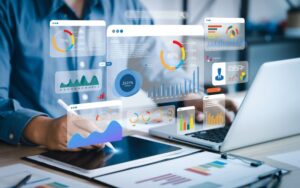In today’s competitive business environment, choosing the right software solution is crucial for success. Two of the most popular options are Enterprise Resource Planning (ERP) and Customer Relationship Management (CRM) systems. But how do you decide between ERP or CRM? Understanding the key differences between these systems will help you determine which one best fits your business needs.
What is ERP vs CRM?
At a basic level, ERP systems vs CRMs serve different purposes within an organization.
Enterprise Resource Planning (ERP) is a comprehensive system that integrates various business processes, including inventory management, supply chain management, finance, and human resources. ERP software is designed to streamline operations, improve efficiency, and provide a unified view of your business.
Customer Relationship Management (CRM), on the other hand, focuses on managing customer interactions and relationships. CRM software helps businesses track customer data, manage contact information, and improve customer experience through better sales and customer service.
ERP vs CRM: The Key Differences
The primary CRM vs ERP difference lies in their focus and functionality.
- Scope: ERP systems are broader, encompassing various business processes across departments. CRM systems are more specialized, focusing on customer interactions and relationship management.
- Data Management: ERP software manages data related to business operations, such as inventory, supply chain, and financials. CRM systems handle customer data, including contact information, customer interactions, and sales history.
- Business Impact: ERP systems streamline operations and improve efficiency across the organization. CRM systems enhance customer experience and support marketing campaigns and sales efforts.
The Benefits of ERP Systems
When deciding between ERP or CRM, it’s important to consider the specific needs of your business. For many organizations, an ERP system offers a more comprehensive solution that addresses multiple aspects of business management.
- Streamlined Operations: ERP systems integrate various business processes into a single platform, reducing repetitive tasks and improving efficiency. This integration allows businesses to manage inventory, finances, and supply chain operations seamlessly.
- Unified Data: With an ERP system, all business data is stored in a centralized database, providing a unified view of the organization. This unified data helps in making informed decisions and ensures that all departments are working with the same information.
- Improved Resource Management: ERP systems excel at managing resources, from raw materials to human capital. This comprehensive approach ensures that resources are allocated efficiently, reducing waste and maximizing productivity.
- Scalability: As your business grows, an ERP system can easily scale to accommodate new processes, products, and services. This scalability makes ERP systems a long-term solution for growing businesses.
When to Choose a CRM System

While ERP systems offer a broad range of features, CRM systems are specifically designed to manage customer relationships and interactions. If your business is primarily focused on improving customer experience, a CRM system might be the better choice.
- Customer Data Management: CRM systems excel at managing customer information, including contact details, purchase history, and communication records. This detailed customer data allows businesses to tailor their marketing campaigns and sales efforts to individual customer needs.
- Sales and Customer Service: CRM systems provide tools for managing sales pipelines, tracking customer interactions, and improving customer service. This focus on customer relationship management helps businesses build a loyal customer base and drive repeat business.
- Marketing Campaigns: CRM systems enable businesses to manage and analyze marketing campaigns, track leads, and measure the effectiveness of their marketing efforts. This targeted approach helps in optimizing marketing strategies and improving customer engagement.
- Enhanced Customer Experience: By providing a detailed view of each customer, CRM systems allow businesses to personalize their interactions, resulting in an improved customer experience.
ERP or CRM: Making the Right Choice
The choice between ERP and CRM ultimately depends on the specific needs of your business. Here are some factors to consider when making your decision:
- Business Size: Larger organizations with complex business processes may benefit more from an ERP system, which can integrate multiple departments and functions. Smaller businesses or those with a strong focus on sales and customer service might find a CRM system more suitable.
- Operational Focus: If your primary goal is to streamline operations, manage inventory, and improve supply chain management, an ERP system is likely the better choice. However, if your focus is on improving customer interactions and driving sales, a CRM system may be more beneficial.
- Budget: ERP systems tend to be more expensive and complex to implement than CRM systems. If budget constraints are a concern, it might be worth starting with a CRM system and expanding to an ERP system as your business grows.
ERP vs CRM Software: Can You Use Both?

For many businesses, the best approach is not choosing between ERP or CRM but integrating both systems. ERP and CRM systems can complement each other, providing a comprehensive solution that addresses all aspects of business management.
- Integrated Solutions: Many ERP systems now offer integrated CRM modules, allowing businesses to manage both operations and customer relationships from a single platform. This integration ensures that customer data and business processes are aligned, providing a seamless experience for both employees and customers.
- Enhanced Data Sharing: By using both ERP and CRM systems, businesses can ensure that data flows smoothly between departments. For example, customer data from the CRM system can be used to inform inventory management and production planning in the ERP system.
- Improved Decision-Making: With access to comprehensive data from both ERP and CRM systems, businesses can make more informed decisions that improve overall performance and customer satisfaction.
The Impact on Your Business
Whether you choose an ERP system, a CRM system, or both, implementing the right software solution can significantly impact your business processes:
- Efficiency: ERP systems streamline operations, reducing repetitive tasks and improving efficiency across the organization.
- Customer Experience: CRM systems enhance customer interactions, providing a personalized experience that drives customer loyalty.
- Growth: Both ERP and CRM systems provide the tools needed to scale your business, whether through improved resource management or enhanced customer relationship management.
The Bottom Line: ERP or CRM - Which Do You Need?
Choosing between ERP or CRM systems is a critical decision for any business. If your focus is on streamlining operations and managing business processes, an ERP system is likely the best choice. However, if your priority is improving customer interactions and driving sales, a CRM system might be more suitable.
In many cases, integrating both ERP and CRM systems offers the best of both worlds, allowing businesses to manage operations and customer relationships seamlessly. By carefully evaluating your business needs and understanding the difference between ERP and CRM, you can make an informed decision that will support your organization’s growth and success for years to come.
